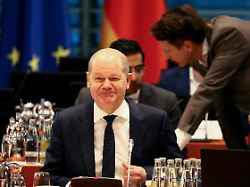49 euro ticket on the agenda
Country leaders wrestle with Scholz for money
12/08/2022 5:06 p.m
At the state meeting with Chancellor Scholz, it’s all about money: the federal government wants to get the Prime Minister into the coffers for energy aid for small and medium-sized businesses. They, in turn, want a higher financial commitment for the 49-euro ticket. A breakthrough is possible.
The chairman of the Prime Ministers’ Conference (MPK), Lower Saxony’s head of government, Stephan Weil, is hoping at the federal-state meeting for an agreement on hardship regulations for companies particularly affected by the energy crisis. “Particularly important is the help that small and medium-sized companies need if they are hit harder than average,” said the Social Democrat in the afternoon after a meeting of the country heads in Berlin. An agreement on this topic “could succeed today”.
It’s about companies that are directly affected, for example, by high energy prices or expensive primary products. So far, the federal and state governments have had a “controversial view” of these hardship regulations, said Weil. The federal government wanted to make one billion euros available, but also demanded that the federal states make their own contribution. However, the federal states did not consider such an own contribution “appropriate” because they had already started their own aid programs, said Weil.
“Cost framework for the 49-euro ticket is not tenable”
According to Weil, the financing of the planned Germany ticket must also be discussed at the meeting of the state leaders with Chancellor Olaf Scholz. The cost framework that has been considered so far is “unsustainable,” he said. Overall, however, Weil dampened expectations of the meeting in the Chancellery. “Overall, it’s not a session that should be particularly spectacular,” he said.
In the ongoing dispute over the financing of the 49-euro ticket for local transport, the federal states are demanding that the federal government also bear half of any additional costs. There was a consensus on a half split between the federal and state governments, explained Weil. At the moment, however, it can be stated that the originally planned cost framework will “probably not be sustainable”. “That has to be discussed and hopefully clarified,” said Weil.
North Rhine-Westphalia’s Prime Minister Hendrik Wüst also warned that the ticket price of 49 euros was too low. The transport industry calculated with 69 euros. If the traffic light government wants a 49-euro ticket, “then you won’t find a solution with the calculation basis of a 69-euro ticket,” said the CDU politician. “In the end, it must not go so far that the 49-euro ticket comes, but we cancel services, trains and buses.”
More speed with compulsory insurance against flooding
The “Germany ticket” for buses and trains in local transport with an introductory price of 49 euros per month is to come in the new year and tie in with the popular 9-euro ticket from the summer. The start date is still open, the countries are aiming for April 1st. At the end of November, the transport ministers of the federal states declared that they expected the federal government to split possible additional costs equally between the federal and state governments and to bear them jointly. In general, the federal and state governments had agreed to finance up to three billion euros per year in half.
The federal states are also putting pressure on the federal government to quickly submit a draft law for compulsory insurance against natural hazards as a result of the flood disaster of 2021. The federal and state governments agreed on this in the summer, said Wüst. The promised draft is still not there.
